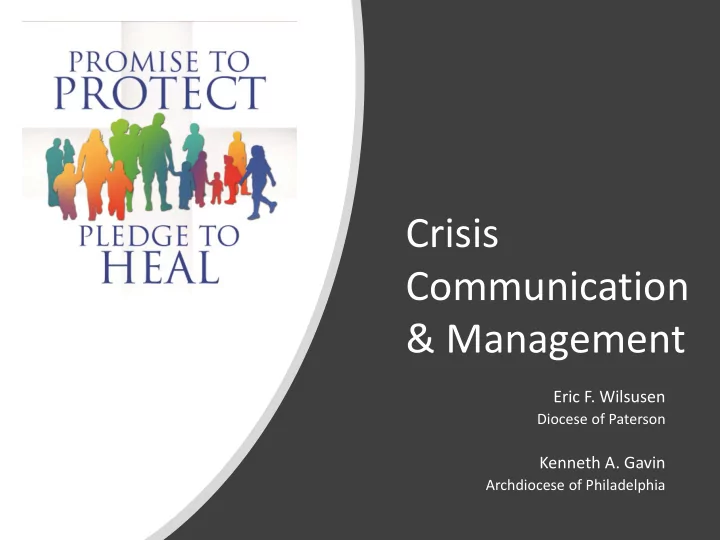

Crisis Communication & Management Eric F. Wilsusen Diocese of Paterson Kenneth A. Gavin Archdiocese of Philadelphia
Best Practices o Policy Development o Pre-Event Planning o Partnerships with the public o Listen to the Public’s Concern and Understand the Audience o Honesty, Candor & Openness o Collaborate & Coordinate with Credible Sources o Meet the need of the Media and Remain Available o Communicate with Compassion, Concern & Empathy o Accept Uncertainty & Ambiguity
Anticipate Crises 1 2 3 4 Be Proactive Prepare in Consult with your Prepare possible advance Communications responses Team
Identify your Crisis Communication Team Identify small team, top level of organization Have a Communication director in some capacity
The right skills Identify and All organizational spokespersons during a Train Your The right position crisis situation must have: Spokesperson A back up spokesperson is The right training suggested
Spokesperson Training Spokesperson training teaches you to be prepared, to be ready to respond in a way that optimizes the response of all stakeholders, especially if you are not dealing with crisis all the time.
Establish Notification & Monitoring It is absolutely essential, pre-crisis, to establish notification systems that will allow you to rapidly reach your stakeholders using multiple modalities.
Identify & Know your stakeholders • Who are the internal and external stakeholders that matter to your organization?
While full message development must • await the outbreak of an actual crisis, Develop “holding statements,” messages designed for use immediately after a Holding crisis breaks, can be developed in advance to be used for a wide variety Statements of scenarios to which the organization is perceived to be vulnerable
• Assessing the crisis situation is, Assess the therefore, the first crisis communications step you can’t Crisis take in advance. Situation
Finalize and adapt a key messages • With holding statements available as a starting point, the Crisis Communications Team must continue developing the crisis-specific messages required for any given situation.
Post Crisis Analysis • A formal analysis of what was done right, what was done wrong, what could be done better next time and how to improve various elements of crisis preparedness is another must- do activity for any Crisis Communications Team.
Recommend
More recommend